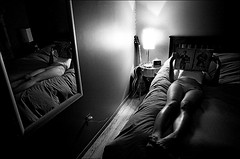This Week's HNT Photo Winner: we have lots right around us to Remember
I liked this picture for the shiney legs and casual/comfy vibe it gives off. She's reading a magazine by the lamplight in what looks like a humid hotel some summer night, with her guitar sitting in the corner.
This contrasts the current feeling of war and terror as we near Rememberence Day, which started when the armistice was signed following WWI aka "the war to end all wars" on November 11, 1918. The death toll for American soldiers killed in Iraq reached 2000 last month.There was a loud series of explosions that ripped through hotels in Amman, Jordan, last night, killing 56 people, and disrupting a wedding.
Many cities in France have been in flames this last few weeks, after two of one of France's marginalized region's poorer youths were electrocuted in a power-box, hiding from police. Car burnings and a string of arson resulted, persuading the French government to impose curfews. Even immigrants who have lived in France for several generations still feel mistreated by French society, and racism continues. Nicolas Sarkozy had said that the community needed to be cleaned of "scum".
Canadians wear the poppy, because regardless of whether we know what it is like to die for our country or for freedom, those who did fought with the hope that some day peace would prevail. What is there to remember though? Cruelty and bloodshed? Idiocy? Some of the most remembered acts of heroism seem to also be the most controversial. The amount of lives lost by Canadians gave us political leverage after the war to influence the Treaty of Versailles, but the cost was massive. For example, in April 1917, Canadian troops held a few square kilometres of mud during the Passchendaele offensive, which cost them 8134 lives. History just keeps repeating itself. In many cases, people emmigrate to try to forget horrible pasts. Is it really necessary to remember, when the powerful people of the world keep choosing a strategy of militarism to combat their enemies and fears?
I lived in the house across the street from where the writer of this poem, John McCrae lived. He served in WWI and in the Boer war, as a surgeon, dressing wounded soldiers. This is what it says on the Canadian ten dollar bill:
"In Flanders fields the poppies blow
Between the crosses, row on row
That mark our place; and in the sky
The larks, still bravely singing, fly
Scarce heard amid the guns below.
We are the Dead. Short days ago
We lived, felt dawn, saw sunset glow,
Loved and were loved, and now we lie
In Flanders fields.
Take up our quarrel with the foe:
To you from failing hands we throw
The torch; be yours to hold it high.
If ye break faith with us who die
We shall not sleep, though poppies grow
In Flanders fields."
This contrasts the current feeling of war and terror as we near Rememberence Day, which started when the armistice was signed following WWI aka "the war to end all wars" on November 11, 1918. The death toll for American soldiers killed in Iraq reached 2000 last month.There was a loud series of explosions that ripped through hotels in Amman, Jordan, last night, killing 56 people, and disrupting a wedding.
Many cities in France have been in flames this last few weeks, after two of one of France's marginalized region's poorer youths were electrocuted in a power-box, hiding from police. Car burnings and a string of arson resulted, persuading the French government to impose curfews. Even immigrants who have lived in France for several generations still feel mistreated by French society, and racism continues. Nicolas Sarkozy had said that the community needed to be cleaned of "scum".
Canadians wear the poppy, because regardless of whether we know what it is like to die for our country or for freedom, those who did fought with the hope that some day peace would prevail. What is there to remember though? Cruelty and bloodshed? Idiocy? Some of the most remembered acts of heroism seem to also be the most controversial. The amount of lives lost by Canadians gave us political leverage after the war to influence the Treaty of Versailles, but the cost was massive. For example, in April 1917, Canadian troops held a few square kilometres of mud during the Passchendaele offensive, which cost them 8134 lives. History just keeps repeating itself. In many cases, people emmigrate to try to forget horrible pasts. Is it really necessary to remember, when the powerful people of the world keep choosing a strategy of militarism to combat their enemies and fears?
I lived in the house across the street from where the writer of this poem, John McCrae lived. He served in WWI and in the Boer war, as a surgeon, dressing wounded soldiers. This is what it says on the Canadian ten dollar bill:
"In Flanders fields the poppies blow
Between the crosses, row on row
That mark our place; and in the sky
The larks, still bravely singing, fly
Scarce heard amid the guns below.
We are the Dead. Short days ago
We lived, felt dawn, saw sunset glow,
Loved and were loved, and now we lie
In Flanders fields.
Take up our quarrel with the foe:
To you from failing hands we throw
The torch; be yours to hold it high.
If ye break faith with us who die
We shall not sleep, though poppies grow
In Flanders fields."




2 Comments:
And you know what? Mankind will keep repeating those same mistakes again and again whilst weeping crocodile tears.
Beautiful poem.
remeberance day.....i love in flanders fields.
Post a Comment
<< Home